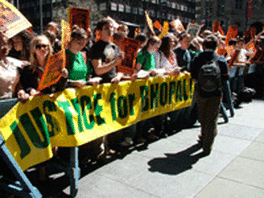The History of Get on the Bus
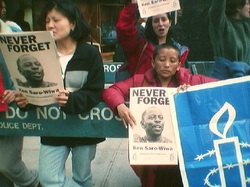
The first Get on the Bus (GOTB) trip to New York City took place on April 19, 1996 when thirty Amnesty Group 133 members (Somerville, Mass. - near Boston) thought it would be good to take a day trip down to New York City to visit the United Nations.
Of course, human rights activists can never pass up the chance to have a demonstration, especially when spending the day near so many foreign consulates. The trip was taking place only a few months after a devastating event had occurred... the execution of Ken Saro-Wiwa and eight other peaceful environmental activists in Nigeria. We decided that we should take the opportunity to tell the Nigerian Government exactly how upset we were about the deaths of these heroic activists.
The day was an incredible success. Activists from Boston and New York paced in front of the Nigerian Consulate shouting, "Ken Saro-Wiwa... We will not forget!" And to keep our word that we would not forget, we decided that we'd just have to go back every year.
From this modest beginning, GOTB has grown exponentially each year.
Of course, human rights activists can never pass up the chance to have a demonstration, especially when spending the day near so many foreign consulates. The trip was taking place only a few months after a devastating event had occurred... the execution of Ken Saro-Wiwa and eight other peaceful environmental activists in Nigeria. We decided that we should take the opportunity to tell the Nigerian Government exactly how upset we were about the deaths of these heroic activists.
The day was an incredible success. Activists from Boston and New York paced in front of the Nigerian Consulate shouting, "Ken Saro-Wiwa... We will not forget!" And to keep our word that we would not forget, we decided that we'd just have to go back every year.
From this modest beginning, GOTB has grown exponentially each year.
1997 - 2000
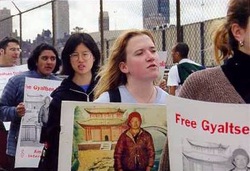
Each year, GOTB has grown in size as well as in the amount of activity. In 1997 we demonstrated at the Nigerian Consulate as well as the Chinese Consulate on behalf of two Tibetan Prisoners-of-Conscience, Gyaltsen Drolkar and Gyaltsen Choezom. In 1998 we added a third demonstration at the United States Mission to the UN to call attention to the situation in Burundi. In 1999 we repeated the demonstrations at the Chinese and Nigerian Consulates, and added a demonstration at the Chinese Mission.
The year 2000 precipitated another visit to the Chinese Mission. We also protested at the Colombian Mission, and showed our support to the German Mission in their fight against the U.S. Death Penalty.
The year 2000 precipitated another visit to the Chinese Mission. We also protested at the Colombian Mission, and showed our support to the German Mission in their fight against the U.S. Death Penalty.
2001-2005
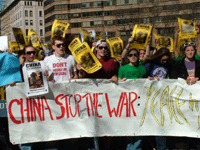
The 2001 Human Rights Odyssey showed more than 500 activists from eight different states demonstrating at the Colombian, Nigerian and Chinese Consulates, with a side visit to the Italian Consulate in support of their work against the death penalty.
The 2002 GOTB saw nearly 800 activists from eleven different states and 100 different groups demonstrating at the Russian and Chinese Consulates. For the first time ever, we held a rally in Central Park featuring speakers from the ACLU and Amnesty International, as well as live music. The speaker's panel included Bill Pelke (MVFR), Masuda Sultan (YAWA) and Rita Lazar and Collen Kelly (members of Peaceful Tomorrows).
2003 brought together over 800 participants from over 120 different groups across 12 states and nearly a dozen countries. We visited the Russian Consulate for the second year in a row (about disappearances in Chechnya), the US Mission to the UN (refugees and detentions), and the Chinese Consulate. A rally in central park welcomed Xu Wenli, as did the afternoon speakers panel.
In 2004, GOTB demonstrated outside the Egyptian consulate for the release of the Agouza 12, men imprisoned in Egypt because of their sexual orientation and to protest the widespread pattern of police entrapment, detention and ill-treatment of allegedly gay men in Egypt. Wissam Tawfiq Abyad spoke at the speakers' panel about his imprisonment in Egypt for "habitual debauchery" after he met a contact from a gay website in Cairo. We also protested violence against women in Russia, in particular the lack of legal protection of women from domestic violence, and demanded that the Chinese government not execute Tibetan monk Tenzin Delek, a religious and community leader who was convicted of planting a bomb and producing and distributing separatist leaflets advocating Tibetan independence.
2005 was the 10th anniversary of GOTB. The event featured an action at the Indian consulate, where we commemorated the 20th anniversary of the chemical plant disaster in Bhopal and demanded that companies which evade their human rights responsibilities be held accountable. We also protested violence against gay people in Jamaica and asked for legal reforms and heard from Larry Chang, a Chinese-Jamaican gay activist granted political asylum in the US in 2004. At the Chinese consulate, we demanded the release of Tenzin Delek Rinpoche, whose death sentence was commuted to life in prison in January 2005. We also asked the Mexican government to hold police accountable for their failure to solve the cases of more than 370 abductions and murders of young women over the past 12 years in Juárez and Chihuahua.
The 2002 GOTB saw nearly 800 activists from eleven different states and 100 different groups demonstrating at the Russian and Chinese Consulates. For the first time ever, we held a rally in Central Park featuring speakers from the ACLU and Amnesty International, as well as live music. The speaker's panel included Bill Pelke (MVFR), Masuda Sultan (YAWA) and Rita Lazar and Collen Kelly (members of Peaceful Tomorrows).
2003 brought together over 800 participants from over 120 different groups across 12 states and nearly a dozen countries. We visited the Russian Consulate for the second year in a row (about disappearances in Chechnya), the US Mission to the UN (refugees and detentions), and the Chinese Consulate. A rally in central park welcomed Xu Wenli, as did the afternoon speakers panel.
In 2004, GOTB demonstrated outside the Egyptian consulate for the release of the Agouza 12, men imprisoned in Egypt because of their sexual orientation and to protest the widespread pattern of police entrapment, detention and ill-treatment of allegedly gay men in Egypt. Wissam Tawfiq Abyad spoke at the speakers' panel about his imprisonment in Egypt for "habitual debauchery" after he met a contact from a gay website in Cairo. We also protested violence against women in Russia, in particular the lack of legal protection of women from domestic violence, and demanded that the Chinese government not execute Tibetan monk Tenzin Delek, a religious and community leader who was convicted of planting a bomb and producing and distributing separatist leaflets advocating Tibetan independence.
2005 was the 10th anniversary of GOTB. The event featured an action at the Indian consulate, where we commemorated the 20th anniversary of the chemical plant disaster in Bhopal and demanded that companies which evade their human rights responsibilities be held accountable. We also protested violence against gay people in Jamaica and asked for legal reforms and heard from Larry Chang, a Chinese-Jamaican gay activist granted political asylum in the US in 2004. At the Chinese consulate, we demanded the release of Tenzin Delek Rinpoche, whose death sentence was commuted to life in prison in January 2005. We also asked the Mexican government to hold police accountable for their failure to solve the cases of more than 370 abductions and murders of young women over the past 12 years in Juárez and Chihuahua.
2006 - 2010
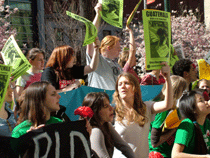
In 2006, we protested at the Sudanese Mission to the UN about the ongoing conflict in Darfur, which at the time had take more than 200,000 civilians lives displaced over 2.5 million. Many of these gross violations came primarily at the hands of pro-government militias. AIUSA demanded that the Sudanese government provide protection for civilians in Darfur and allow full and unfettered access to humanitarian relief. We also protested at the Ethiopian Mission to the UN against the government's brutal political crackdown on opposition members and human rights activists following the May 15, 2005 election. We called for the government to unconditionally release those arrested and for a halt to the government's criminalization of free expression and legitimate political activity. Lastly, we demonstrated at the the Guatemalan Consulate to highlight the failure of Guatemalan authorities to adequately investigate murders of over 1,900 young women or bring their killers to justice.
GOTB 2007 featured four actions. One of our targets was the Chinese Mission the UN, where we protested against China's irresponsible business dealings in Sudan which has compounded the humanitarian crisis in Darfur. We also advocated for the release of Mesfin Woldemariam, a prisoner of conscience and one of Ethiopia's most prominent human rights defenders. We demonstrated at the Guatemalan Consulate to call for the extradition of former Guatemalan dictator, General Efrain Rios Montt, to be tried for crimes against humanity. We called on JP Morgan to encourage its shareholders of Dow Chemical stock to vote in favor of a resolution that would benefit the victims of the Bhopal gas disaster of 1984. Finally, we collected hundreds of signatures for Amnesty International's "The America I Believe in" campaign to protest the U.S. government's use of torture and other human rights violations in the "War on Terror".
In 2008 we focused on journalists at risk in Sri Lanka, a call for justice in Darfur, support of the Burmese people in Myanmar, freedom for Fathi el-Jahmi in Libya, and a Bhopal action at the Indian Consulate.
2009 features actions to free Aung San Suu Kyi and protect civilians in Sri Lanka. We protested to stand up to mining companies in Guatemala, and as we do every year, we protested at the Chinese Consulate, calling for the protection of free speech in Tibet.
In 2010, we celebrated 15 years of supporting human rights. We called for the release of Aung San Suu Kyi and political prisoners in Burma. We urged the Sri Lankan government to strike down the conviction of journalist J.S. Tissainayagam and grant him an unconditional release. We demanded the immediate and unconditional release of Tibetan filmmaker Dhondup Wangchen. And we stood in solidarity as a voice for Justine Masika Bihamba and other women fighting to protect themselves in the Democratic Republic of the Congo.
GOTB 2007 featured four actions. One of our targets was the Chinese Mission the UN, where we protested against China's irresponsible business dealings in Sudan which has compounded the humanitarian crisis in Darfur. We also advocated for the release of Mesfin Woldemariam, a prisoner of conscience and one of Ethiopia's most prominent human rights defenders. We demonstrated at the Guatemalan Consulate to call for the extradition of former Guatemalan dictator, General Efrain Rios Montt, to be tried for crimes against humanity. We called on JP Morgan to encourage its shareholders of Dow Chemical stock to vote in favor of a resolution that would benefit the victims of the Bhopal gas disaster of 1984. Finally, we collected hundreds of signatures for Amnesty International's "The America I Believe in" campaign to protest the U.S. government's use of torture and other human rights violations in the "War on Terror".
In 2008 we focused on journalists at risk in Sri Lanka, a call for justice in Darfur, support of the Burmese people in Myanmar, freedom for Fathi el-Jahmi in Libya, and a Bhopal action at the Indian Consulate.
2009 features actions to free Aung San Suu Kyi and protect civilians in Sri Lanka. We protested to stand up to mining companies in Guatemala, and as we do every year, we protested at the Chinese Consulate, calling for the protection of free speech in Tibet.
In 2010, we celebrated 15 years of supporting human rights. We called for the release of Aung San Suu Kyi and political prisoners in Burma. We urged the Sri Lankan government to strike down the conviction of journalist J.S. Tissainayagam and grant him an unconditional release. We demanded the immediate and unconditional release of Tibetan filmmaker Dhondup Wangchen. And we stood in solidarity as a voice for Justine Masika Bihamba and other women fighting to protect themselves in the Democratic Republic of the Congo.
